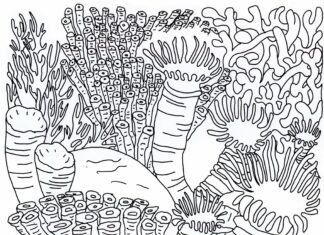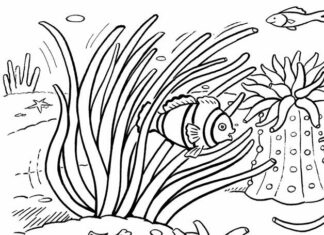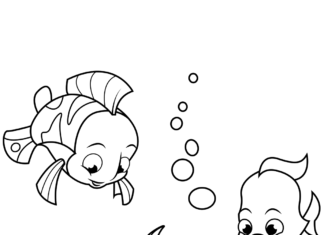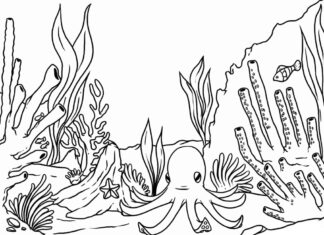Coral reefs are amazing and complex marine ecosystems that play a key role in the health of the oceans.
Coloring Book Coral Reef
Information
- Definition of: Coral reefs are underwater ecosystems made up mainly of corals. Corals are animals that secrete calcium to form hard skeletons that serve as the base of the reef.
- Biodiversity: Coral reefs are among the most biodiverse ecosystems in the world. Although they occupy less than 1% of ocean area, they are home to some 25% of all marine species.
- Economic significance: Coral reefs provide habitat for many species of fish, which are the mainstay of local fisheries. Many coastal communities depend on the fisheries and tourism associated with the reefs.
- Threats: Coral reefs are currently facing many threats, including climate warming, overfishing, pollution and physical damage. As a result of these threats, many coral reefs are experiencing bleaching.
- Coral bleaching: This is the process by which corals lose their symbiotic algae (zooxanthellae) and turn white. This can lead to the death of corals if proper conditions are not restored.
- Benefits for people: In addition to providing food and income from tourism, coral reefs also serve a protective function, reducing wave power and protecting coastlines from erosion.
- Disposition: Although coral reefs can be found in oceans around the world, the largest concentration is in the Indo-Pacific. The Great Barrier Reef off the coast of Australia is the largest living structure in the world.
- Cultural significance: For many coastal communities, coral reefs have deep cultural and spiritual significance.
- Restoring the reefs: In response to global declines in the health of coral reefs, many organizations and scientists are working on methods to restore and rebuild reefs, such as growing corals in laboratories and transplanting them onto damaged reefs.
-
Impact of ocean acidification: Increased atmospheric concentrations of carbon dioxide are leading to ocean acidification, which could adversely affect the ability of corals to produce calcareous skeletons. trivia
- Ancient design: Some coral reefs are as old as 500 million years, making them among the oldest living ecosystems on Earth.
- Size from space: The Great Barrier Reef, which stretches along Australia's east coast, is the largest living structure in the world and can be seen from space.
- Pharmacy of the oceans: Coral reefs are sometimes called the "pharmacies of the oceans" because of their potential to deliver new medicines. Already, some corals are being studied for potential cures for cancer, HIV and other diseases.
- Cities under water: Although coral reefs occupy less than 1% of the ocean floor, they are home to nearly 25% of all marine species, making them among the most biodiverse ecosystems on Earth.
- Corals are not plants: Although they may look like plants or stones, corals are actually animals. They belong to the same family as jellyfish and parasitoids.
- Symbiosis with algae: Corals live in symbiosis with microscopic algae called zooxanthellae, which provide corals with most of their food through photosynthesis.
- Variable colors: The brilliant colors of coral reefs come from these algae. When corals are stressed, they can release algae, leading to a phenomenon called coral bleaching.
- Barrier builders: Corals form skeletons of calcium carbonate that, over time, fuse together to form huge coral reef structures. These barriers protect coastlines from erosion and reduce the force of waves during storms.
- Temperature sensitivity: Coral reefs are extremely sensitive to temperature changes. Just an increase of 1-2 degrees Celsius can lead to massive coral bleaching.
- A threat to humanity: More than 500 million people around the world depend directly on coral reefs for both food and income from tourism or fishing. However, due to human activities such as pollution, overfishing and climate change, coral reefs are under serious threat.










